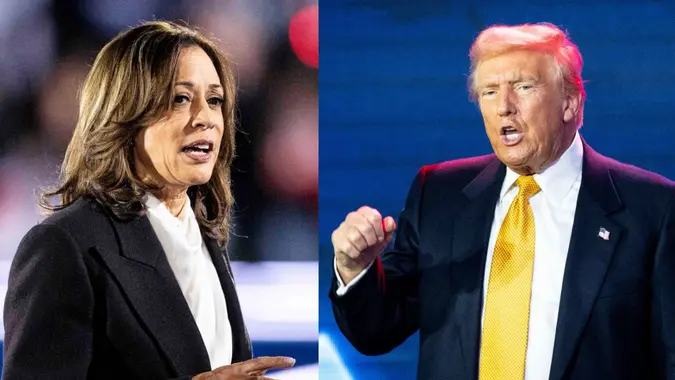6 Reasons Both Trump and Harris’ Policies Could Hurt Your Wallet

Commitment to Our Readers
GOBankingRates' editorial team is committed to bringing you unbiased reviews and information. We use data-driven methodologies to evaluate financial products and services - our reviews and ratings are not influenced by advertisers. You can read more about our editorial guidelines and our products and services review methodology.

20 Years
Helping You Live Richer

Reviewed
by Experts

Trusted by
Millions of Readers
Not everyone lines up neatly on “Team Red” or “Team Blue.” Many Americans look at the campaigns of former President Donald Trump and Vice President Kamala Harris and see guaranteed disappointment, no matter which candidate takes the Oval Office.
Disappointment borne not just from political opinions, but actual financial impact on their wallets.
Beware of the following financial risks that the candidates pose as the election reaches its climax.
Increased Healthcare Costs
“Both candidates’ policies could potentially increase financial strain,” said family law attorney Katie L. Lewis. “For example, Harris’ healthcare proposals could lead to increased costs for middle-income families.”
While Harris has stopped proposing a new 4% tax on families earning $100,000 or more to pay for a version of “Medicare for all,” like she proposed in the 2020 Democratic primary, she has proposed several expansions to Medicare that would cost taxpayers money.
Republicans and Democrats differ on the enhanced subsidies under the Affordable Care Act. The original law put an income cap on who receives taxpayer subsidies for their health insurance, but Congressional Democrats removed the cap in 2021 and expanded the subsidies. Harris has proposed making these subsidies permanent, as reported by KFF Health News, at a cost estimated by the Congressional Budget Office at $335 billion over the next decade.
While Trump hasn’t officially stated a position, many Republicans have sought to reinstate the income cap, as reported by Tax Notes.
Tariffs
Trump has famously proposed tariffs of 10%-20% on imports from all other countries and 60% tariffs on Chinese goods.
Somebody has to pay for those, and that somebody is the American consumer. Retailers don’t just swallow those losses — they pass them on in the form of higher prices.
While less vocal in promoting them, Harris has backed tariffs, too. Not only has the Biden-Harris White House left most Trump-era tariffs in place, they’ve actually increased some of them. For instance, the BBC reported that the administration quadrupled tariffs on Chinese electric vehicles, from 25% to 100%, and doubled tariffs on solar power cells. That move angered some environmentalists, who wanted to see more affordable access to EVs.
Still, voters can likely expect higher tariffs under a Trump presidency, and those higher consumer prices can pump up inflation.
Inflation
Tariffs aren’t the only inflationary policy that both candidates have embraced.
Trump hopes to make the tax cuts from the Tax Cuts and Jobs Act of 2017 permanent. Currently, most provisions sunset at the end of 2025. But lower personal and corporate tax rates are designed to stimulate the economy — which drives inflation.
The former president has also repeatedly called for less corporate regulation, another form of economic stimulus. It, too, can lead to faster price increases.
For her part, Harris has proposed plenty of subsidies and credits that would flood more money into consumer spending, potentially driving inflation higher. For example, ABC News reported on her $25,000 subsidy for first-time home buyers, which would likely drive home prices higher, because buyers would be able to bid more.
Likewise, government subsidies and cancellations of student loans allow colleges to keep raising tuition and fees at breakneck speed. Universities would likely lower tuition if they were forced to by customers unwilling to keep paying outrageous amounts, but if taxpayers keep footing the bill, they’ll keep raising it.
Ballooning Government Debt
“Excessive government spending can certainly lead to inflation, and there’s an argument that both candidates will overspend,” said Jake Falcon, CEO of Falcon Wealth Advisors.
Higher government spending drives not just inflation but also the nation’s debt. Debt that will someday need to be repaid — or inflated away — and that costs taxpayers hundreds of billions in interest each year.
A growing economy can help, but only if it grows faster than government spending — which it hasn’t. That leaves the storm cloud of higher taxes looming on the horizon.
Higher Tax Rates
Falcon continued, “Paying higher taxes is not something most Americans want, and it will be largely unpopular to make the necessary changes to shrink the U.S. debt issue.”
The Harris campaign has proposed raising the top income tax rate to 39.6% and raising the top capital gains and qualified dividends tax rate to 28%, as reported by the Tax Foundation. They have also proposed tighter restrictions on retirement account contributions for higher earners, although details have been scarce.
The vice president has also endorsed a bill introduced by Senator Elizabeth Warren that would drop the estate tax exemption from $13.61 million to $3.5 million. The bill would tax inheritances between 55%-75%, according to Harrison Estate Law.
Lower GDP from Reduced Labor Force
The labor market in the U.S. has been restrictively tight for years, which is a problem that a smoother immigration system could help solve.
“Both candidates have promised more restrictive immigration policies,” said Natalia Polukhtin, immigration attorney at the Global Practice Group in Arizona. “While that can reduce immediate public costs in the short term, it also limits the labor supply and hinders economic growth.
“Some sectors of the economy are especially reliant on immigrant labor and innovation. A study by the American Immigration Council found that mass deportation could remove millions of workers in construction, hospitality and agriculture, reducing gross domestic product by [up to] $1.7 trillion.”
The study estimates the public cost of mass deportations alone at $315 billion.
“Restrictions on high-skilled visas could also impact the tech and STEM industries,” Polukhtin said, “potentially forcing companies to … outsource labor overseas and creating less employment opportunities for American young professionals entering the labor market.”
Whoever takes the Oval Office in 2025, watch out for your wallet by paying attention to policy changes. Speak with both a financial advisor and a tax planner to help you navigate changing investment conditions and tax rules, so you don’t get caught flat-footed by new policies.
Editor’s note on election coverage: GOBankingRates is nonpartisan and strives to cover all aspects of the economy objectively and present balanced reports on politically focused finance stories. You can find more coverage of this topic on GOBankingRates.com.
 Written by
Written by  Edited by
Edited by 

























